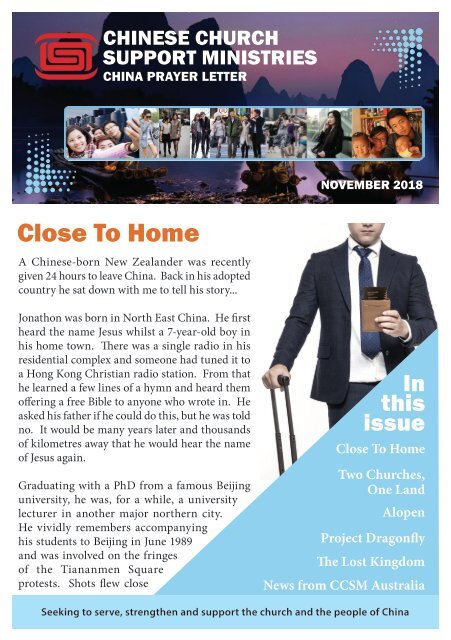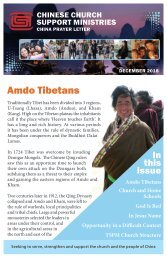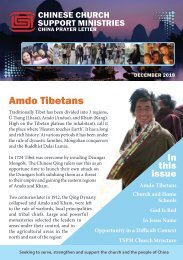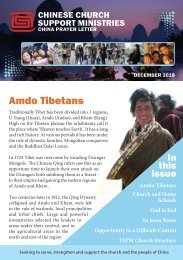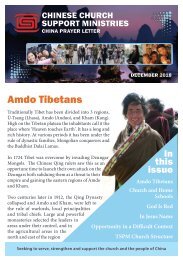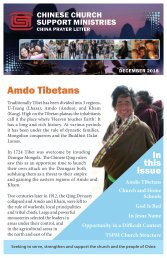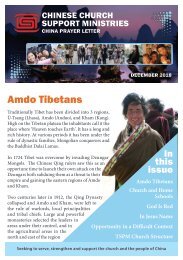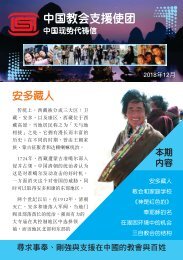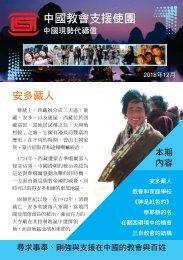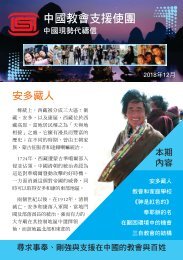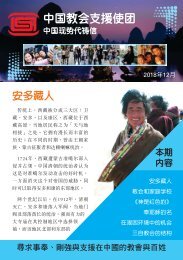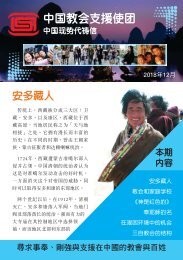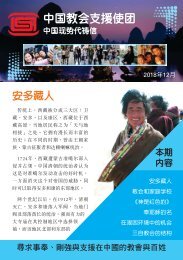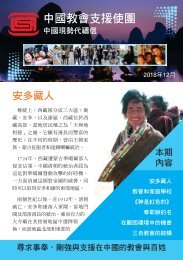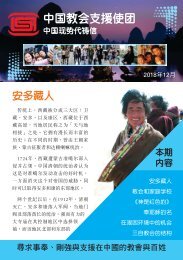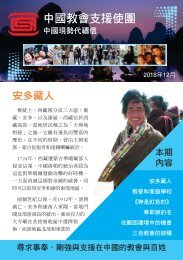Australia November 2018
Create successful ePaper yourself
Turn your PDF publications into a flip-book with our unique Google optimized e-Paper software.
CHINESE CHURCH<br />
SUPPORT MINISTRIES<br />
CHINA PRAYER LETTER<br />
NOVEMBER <strong>2018</strong><br />
Close To Home<br />
A Chinese-born New Zealander was recently<br />
given 24 hours to leave China. Back in his adopted<br />
country he sat down with me to tell his story...<br />
Jonathon was born in North East China. He first<br />
heard the name Jesus whilst a 7-year-old boy in<br />
his home town. There was a single radio in his<br />
residential complex and someone had tuned it to<br />
a Hong Kong Christian radio station. From that<br />
he learned a few lines of a hymn and heard them<br />
offering a free Bible to anyone who wrote in. He<br />
asked his father if he could do this, but he was told<br />
no. It would be many years later and thousands<br />
of kilometres away that he would hear the name<br />
of Jesus again.<br />
Graduating with a PhD from a famous Beijing<br />
university, he was, for a while, a university<br />
lecturer in another major northern city.<br />
He vividly remembers accompanying<br />
his students to Beijing in June 1989<br />
and was involved on the fringes<br />
of the Tiananmen Square<br />
protests. Shots flew close<br />
In<br />
this<br />
issue<br />
Close To Home<br />
Two Churches,<br />
One Land<br />
Alopen<br />
Project Dragonfly<br />
The Lost Kingdom<br />
News from CCSM <strong>Australia</strong><br />
Seeking to serve, strengthen and support the church and the people of China
y, but none hit his group. At the time<br />
he thought it was good luck. He and his<br />
students helped to carry those who were<br />
injured to hospital. These memories are<br />
indelibly lodged in his memory.<br />
Jonathon left the academic world soon<br />
after and worked for some time in a<br />
southern city before deciding to migrate<br />
to New Zealand. He readily found well<br />
paid work and became a New Zealand<br />
citizen.<br />
One day, out of curiosity, he walked into<br />
a Wellington church. He was warmly<br />
welcomed and soon after was given a<br />
Bible for the first time. He read it and<br />
the many questions turned to conviction.<br />
He was born again!<br />
He knew that working and storing up<br />
wealth was not the plan for his life and<br />
he went looking for opportunities to<br />
serve God more fully. He shared his new<br />
faith with anyone who would listen. He<br />
believed that Christians had no option<br />
but to share the Good News.<br />
In 2010, a friend invited him to a major<br />
southern China city where he was<br />
connected to a local unofficial church<br />
that had a strong church planting focus.<br />
For 4 years he trained part time at their<br />
Bible College (also unofficial) and was<br />
given increasing responsibility in his<br />
church.<br />
2<br />
During this time he stayed in<br />
China on a Visitor’s<br />
Visa. At times<br />
he<br />
needed a miracle to get this renewed and<br />
he has many stories of God’s protection.<br />
After graduating from Bible College, he<br />
was sent out as a church planter, ending<br />
up in a regional city in a West China<br />
province.<br />
The church started with one older lady<br />
who he met at the hairdressers and had<br />
grown to about 20 by the beginning of<br />
this year.<br />
Then the trouble began.<br />
The large mother church was raided.<br />
All their resources and equipment were<br />
taken by the police. The pastor and<br />
congregation were warned that if they<br />
tried to meet again they would be heavily<br />
fined. Members had their work places<br />
visited by the police. They were told they<br />
would lose their jobs if they tried to meet<br />
again.<br />
One by one, other churches that had been<br />
planted by the mother church were dealt<br />
to in the same way. The whole network of<br />
churches was systematically dismantled.<br />
Inevitably they arrived at Jonathon’s<br />
church. Even though he used his old<br />
ID card, they knew he was from New<br />
Zealand. In fact, they knew all about<br />
him. He was given 24 hours to leave the<br />
country.<br />
He left behind a house he had bought<br />
but was able to smuggle out his precious<br />
portable hard drive with all its sensitive<br />
information.<br />
A small number of the believers in this<br />
group of churches have retreated to small
cells as part of a contingency plan. Many,<br />
however, were frightened by the threats<br />
of job losses and impossibly heavy fines.<br />
It is for this group of new Christians,<br />
not deeply rooted in the Scriptures, that<br />
Jonathon is most concerned.<br />
Whilst he feels anger at times, he knows<br />
that the church in China will survive<br />
and ultimately grow stronger. But<br />
his thoughts are always for those who<br />
have been isolated from leadership and<br />
teaching. His tears are painful to watch.<br />
Two Churches, One Land<br />
Part 2 of an article by Robert Menzies, “The Future of the Church in China: Why China’s<br />
House Churches will Prevail”. This article was written in 2017, just prior to the persecution<br />
of the house churches in <strong>2018</strong>.<br />
The contrast between typical worship<br />
experiences in Three Self Patriotic<br />
Movement (TSPM) churches and their<br />
house church counterparts could not<br />
be more striking. Whether you attend<br />
a TSPM church in Kunming or Beijing,<br />
the experience will be remarkably similar<br />
to many Protestant worship services<br />
around the world. However, when you<br />
International<br />
Short-Term<br />
Teams<br />
*<br />
attend a house church service, while you<br />
never know exactly what to expect (each<br />
house church has its own distinctive<br />
flavour), you can rest assured that your<br />
experience will be quite different from<br />
past experiences of worship in traditional<br />
mainline churches. In the midst of the<br />
diversity that characterizes the house<br />
church settings, one constant unifies: the<br />
**<br />
Mercy<br />
**<br />
Medical<br />
* Intercession<br />
**<br />
Trekking<br />
**<br />
English Cultural Exchange<br />
December <strong>2018</strong>:<br />
April 2019:<br />
Cultural Exchange Team<br />
Cultural Exchange; Cycle/Intercession; Mercy;<br />
Medical; Come, See & Do Youth Leaders Teams<br />
3
service will reflect the musical styles, the<br />
felt needs, and the familial relationships<br />
that characterize the Chinese context.<br />
This is the real beauty, in my opinion, of<br />
the house church movement in China:<br />
it allows for the rich diversity that<br />
characteristics the body of Christ, and<br />
it does so in an authentically Chinese<br />
way. Worship in the house churches<br />
is more diverse in nature than in the<br />
TSPM churches, and it is also much<br />
more indigenous. A “one size fits all”<br />
approach to church life simply cannot<br />
contain the wonder and beauty of the<br />
body of Christ, globally or in China.<br />
This is true of worship styles, but it is also<br />
true of theology and church structure.<br />
It is especially true when the apparent<br />
uniformity is forced and contrived.<br />
The artificial and contrived nature of the<br />
TSPM churches’ “post-denominational<br />
unity” was recently illustrated for me in<br />
vivid fashion by a friend, Pastor Huang,<br />
who pastors a local house church. Pastor<br />
Huang is associated with the China<br />
Gospel Fellowship (CGF), one of the<br />
larger house church networks in China.<br />
Pastor Huang told me that early in 2016<br />
the leader of the CGF, Uncle Shen, met<br />
with the President of China, Xi Jinping. In<br />
Alopen<br />
Christ sent his disciples to convey his<br />
redemption story to the people of the<br />
world. Yet for six centuries after the<br />
crucifixion we have no documented<br />
record of any Christian missionaries<br />
coming to bring this message to the<br />
Chinese. It is quite possible that the<br />
4<br />
this conversation, Xi Jinping purportedly<br />
asked Uncle Shen, with respect to the<br />
government’s policy toward Christianity,<br />
which of three paths he would prefer<br />
China to travel. The first path would<br />
eliminate the TSPM and only allow for<br />
house churches. The second path would<br />
allow for both the TSPM and the house<br />
churches, with each on equal footing.<br />
The third path would call for the house<br />
churches to become a part of the TSPM.<br />
Apparently, Uncle Shen answered, “Not<br />
path one, not path three, but path two is<br />
my preference.”<br />
I must admit that I am sceptical of<br />
this story’s veracity. Certainly, recent<br />
events suggest that Xi Jinping and his<br />
government have no desire to allow the<br />
house church movement to compete on<br />
equal footing with the TSPM. If the new<br />
regulations governing religious activity<br />
may serve as our guide, it is apparent that<br />
China’s leaders are intent on restricting<br />
further the limited space that currently<br />
exists within China for house church<br />
groups to operate. Nevertheless, I find<br />
this story interesting because it raises an<br />
important question: What would happen<br />
if the TSPM and the house churches were<br />
actually allowed to exist on equal footing?<br />
gospel did reach China in<br />
those early years, but the<br />
details have been lost to<br />
history.<br />
It wasn’t till 1625, when a<br />
limestone tablet named the
Nestorian Stele, or the Xi’an Stele, was<br />
discovered, that the world first learned<br />
of a group of pioneering evangelists<br />
who courageously set out from Dagin<br />
(the Roman Empire) arriving in China<br />
in 635AD, in the 9th year of the reign of<br />
Emperor Taizong (Tai Tsung).<br />
The stele had been erected in 781 and<br />
describes 150 years of early church history<br />
in China. Near its top is the image of a<br />
small decorative cross standing on a lotus<br />
flower. The monument’s inscriptions,<br />
etched predominantly in Chinese,<br />
mention a Nestorian Christian named<br />
Alopen who travelled with a group of<br />
Syriac (Persian) missionaries bringing<br />
sacred books and images. He reached the<br />
Tang capital of Chang'an (now Xi’an) and<br />
was welcomed by the Emperor.<br />
Emperor Taizong, second emperor of<br />
the Tang dynasty, was renowned for his<br />
intelligence and success as a ruler. He<br />
surrounded himself with good advisors<br />
and would even concede to listen to<br />
their criticism, acting on it if he agreed<br />
with their opinion. He practiced a<br />
policy of religious tolerance. His reign is<br />
considered one of the most important in<br />
Chinese history and future leaders would<br />
study his life and attempt to emulate his<br />
rule.<br />
The Emperor Taizong’s birth name was Li<br />
Shimin. He was a learned man and thirsty<br />
for knowledge. His library is reported<br />
to have held 200,000 volumes, on par<br />
with the great library at Alexandria. He<br />
listened to Alopen preach and promptly<br />
organised for his books to be translated<br />
then set about scrutinizing them.<br />
The very first book to be translated was<br />
named the “Sutra of Jesus the Messiah”—<br />
a collection of 206 verses that sought to<br />
explain Christian beliefs and show how<br />
they were compatible with traditional<br />
Chinese values. According to the stele,<br />
Li Shimin found Alopen’s books most<br />
acceptable and included them in the<br />
Imperial library. He had them copied and<br />
distributed.<br />
Three years later, in 638, the Emperor<br />
issued an official edict protecting the<br />
Nestorian church. Alopen was given<br />
permission to preach and spread the<br />
Christian faith. Emperor Taizong<br />
had China's first Christian church and<br />
monastery constructed in Xi’an and<br />
twenty-one monks (likely Persian), were<br />
installed to administer it.<br />
During his rule China would have<br />
many years of peace and prosperity. His<br />
successor, Gao Zong (Kao-Tsung) (650-<br />
683) honoured Alopen with the title<br />
“Guardian of the Empire” and “Lord of<br />
the Great Law”.<br />
The stele accounts that "The religion<br />
spread throughout the ten provinces ...<br />
[and] monasteries abound in a hundred<br />
cities."<br />
After 300 years this time of religious<br />
freedom sadly ground to a halt. In the<br />
mid-ninth century a period of great<br />
persecution of "foreign religions" began.<br />
Christianity all but disappeared from the<br />
Chinese heartland but was continued<br />
through that period in the outer regions<br />
among the Uyghur, Turkish, and<br />
Mongols.<br />
5
Project Dragonfly<br />
Chinese internet users make up a<br />
megamarket that is an irresistible lure<br />
for technology companies such as the<br />
American giant Alphabet Inc, owner of<br />
Google LLC.<br />
Many will remember that Google<br />
operated in China for four years prior<br />
to 2010, meeting compliance with<br />
China’s censorship laws. At the time, a<br />
statement to BBC News Google explained<br />
that, "While removing search results is<br />
inconsistent with Google's mission,<br />
providing no information…is more<br />
inconsistent with our mission." Google<br />
did however provide users with a message<br />
alerting them when search results were<br />
omitted by the censorship process.<br />
Then in 2010, a cyberattack from within<br />
the country hacked into email accounts,<br />
including Gmail addresses. Amongst<br />
those targeted were several prominent<br />
Chinese human-rights activists,<br />
some of whom were convicted and<br />
imprisoned based on their compromised<br />
correspondence.<br />
Google’s response was to make to an<br />
ethical stand. It redirected its Chinese<br />
traffic to the uncensored Hong Kong<br />
version of Google’s search engine.<br />
Predictably, within months Google’s<br />
services were inaccessible on the<br />
mainland.<br />
6<br />
The search engine has since been excluded<br />
from the Chinese market for eight<br />
years. But recently news has emerged that<br />
Google never really left China.<br />
In 2007 Google had quietly formed a<br />
joint venture company with Ganji.com.<br />
This company was named the Guxiang<br />
Information and Technology Co. and it<br />
operates a navigation website called 265.<br />
com under license as a Chinese company.<br />
265.com uses Baidu to return its search<br />
results.<br />
For 10 years, by harvesting its client’s<br />
search data from 265.com, Google has<br />
gathered information to determine<br />
which websites are blocked by China’s<br />
Great Firewall. And in August this<br />
year, a whistle-blower in Google’s staff<br />
revealed that that Google has been<br />
using this data to develop a new search<br />
engine app specifically for China. The<br />
product’s codename is Project Dragonfly.<br />
It is capable of returning searches that<br />
omit China’s restricted sites and search<br />
terms, meeting the Chinese censorship<br />
requirements.<br />
It is said the prototype has already
PRAYER POINTERS<br />
Close to Home<br />
Please pray that Jonathon will continue to be used by God wherever this<br />
might be.<br />
Pray for those new in the faith who have been cut off from their church<br />
life and support. Pray that the Holy Spirit will be their teacher and<br />
they will soon have the opportunity again to gather and encourage one<br />
another.<br />
Cut out this note and slip it into your Bible to help you remember the <strong>November</strong> prayer topics for China<br />
Pray that the interpretation of the law that has led to these actions will<br />
be challenged and freedom to worship for all will be a new reality in<br />
China.<br />
Two Churches, One Land<br />
Thank the Lord that he made China such a rich and diverse nation. Pray<br />
that every Chinese Church will finally be free to worship with their own<br />
unique and indigenous style.<br />
Pray that Xi Jinping will experience the love, freedom and salvation of<br />
the living God.<br />
Alopen<br />
Thank God for sending the Nestorians to bring his gospel message to<br />
China and for making a way for his message to be translated and shared.<br />
Ask God that he will once again open the hearts and minds of the<br />
Chinese leaders to receive his message.<br />
Pray that China will recognise the blessing that comes with Christianity.<br />
Pray that they will recognise Jesus as their “Guardian of the Empire”<br />
and “Lord of the Great Law”.<br />
7
PRAYER POINTERS<br />
Project Dragonfly<br />
Pray for the protection of those 1400 Google staff members that signed the<br />
letter protesting the transparency around Project Dragonfly. Their jobs<br />
could be compromised by taking a stand.<br />
Thank God for people who find the courage to stand on their morals and<br />
speak out.<br />
Pray that Google will chose not to create an app that would advance<br />
surveillance abuses.<br />
Pray for those in power who decide what is to be censored.<br />
The Lost Kingdom<br />
Ask God to make a way for the Ladakhi in Tibet to hear about Jesus in their<br />
own language.<br />
Pray that God will allow Ladakhi in this sensitive region in Tibet greater<br />
freedom to discover the truth of the gospel. Ask God that each and every<br />
Ladakhi in Tibet will have an opportunity to hear about Christ.<br />
Pray that God will find the right people willing to go to this inhospitable<br />
region. Pray that our Father will provide for the needs of those working in<br />
this region.<br />
News from CCSM <strong>Australia</strong><br />
Pray that our churches will assume responsibility for their role as “senders”.<br />
Pray for those young seekers in Sydney that they will say like Isaiah “here<br />
am I, send me!”<br />
Pray for a new release of workers to the harvest fields around the world while<br />
remain white unto harvest. Pray that they will arrive in time.<br />
Chinese Church Support Ministries<br />
Seeking to serve, strengthen<br />
and support the church and<br />
the people of China<br />
8
een demonstrated to Chinese officials.<br />
Whether the service will be accepted and<br />
become publicly available remains to be<br />
seen.<br />
What is obvious is that Google is now<br />
willing to again meet the Chinese<br />
governments censorship requirements<br />
that identify and block websites and<br />
search terms mentioning such things<br />
as peaceful protests, political dissent,<br />
democracy, certain academic studies,<br />
human rights, police brutality and<br />
religion.<br />
The Chinese Communist Party’s aim<br />
with censorship is no doubt to uphold its<br />
position of power, it’s ideologies and of<br />
course to maintain peace in the nation.<br />
To consider censorship as being entirely<br />
negative is foolhardy. There is no doubt<br />
that a level of censorship is beneficial,<br />
such as in cutting out sites that engage<br />
in criminal activity or pornography<br />
(something that both Google and Baidu<br />
could improve on). But in China, where<br />
freedom of speech and freedom of belief<br />
are concerned, the moral high ground is<br />
far more subjective.<br />
Google’s own staff have expressed<br />
concern about Dragonfly and the secrecy<br />
that has shrouded the project. 1400 staff<br />
The Lost Kingdom<br />
signed an internal letter pushing for<br />
more transparency from Google stating,<br />
“Google employees need to know what<br />
we’re building.” And “we do not have the<br />
information required to make ethicallyinformed<br />
decisions about our work, our<br />
projects, and our employment.”<br />
A small number of Google staff resigned<br />
over the issue amongst whom was senior<br />
research scientist Dr Jack Poulson. In<br />
a letter to the Senate committee he<br />
confirmed that Dragonfly could link<br />
Chinese users’ search history with their<br />
phone numbers, potentially allowing<br />
China’s government to easily track their<br />
activity.<br />
These concerns have been further voiced<br />
in an open letter to Sundar Pichai,<br />
Google’s CEO, signed by 14 human rights<br />
groups. This letter raises the concern that<br />
“Offering services through mobile phone<br />
apps, including Google’s existing Chinese<br />
apps, raises additional concerns because<br />
apps enable access to extraordinarily<br />
sensitive data. Given the Cybersecurity<br />
Law’s data localization and other<br />
requirements, it is likely that the company<br />
would be enlisted in surveillance abuses<br />
and their users’ data would be much more<br />
vulnerable to government access.”<br />
In India’s north, beneath the southern<br />
slopes of the Himalayas there is a<br />
region that is vastly different from the<br />
lower foothills and lush green plains.<br />
It is shrouded in snow through winter<br />
and becomes a desert in summer as the<br />
rains are held back by the high mountain<br />
ranges bordering its valleys. Winter<br />
9
temperatures sit at minus 30 Celsius<br />
(-22°F). Farmers rely on melted snow<br />
for their crop’s water supply.<br />
The region was known, until recent<br />
times, as the Kingdom of Ladakh. It used<br />
to stretch from the Baltistan valleys (now<br />
mostly in Pakistan), the upper Indus<br />
Valley, Zanskar, Lahaul & Spiti district<br />
to the south, much of Ngari (also known<br />
as Ali in what is now Tibet, China)<br />
including the Rudok region and Guge in<br />
the east, Aksai Chin (now administered<br />
as part of Hotan County in Xinjiang,<br />
China) in the northeast (extending to<br />
the Kun Lun Mountains), and the Nubra<br />
Valley to the north over Khardong La in<br />
the Ladakh Range.<br />
For a thousand years Ladakh was<br />
an independent kingdom with Leh<br />
(pronounced Lie) as its capital and its<br />
own language. It was once a major city<br />
along the Asian Silk Route. It endured<br />
periodic incursions from its Muslim<br />
neighbours in the west and war with<br />
Tibetans in the East, unstable rulers<br />
and even assassinations; yet it remained<br />
intact.<br />
Its people, the Ladakhi, are a Tibetan<br />
group. Nowadays many Ladakhi are<br />
Shia Muslim but the majority share<br />
the beliefs of their Tibetan Buddhist<br />
neighbours mixed in with images of<br />
ferocious demons from the pre-Buddhist<br />
Bon religion. Traces of influence from<br />
the dark, distant past are found in the<br />
demonic masks and re-enactments of<br />
human sacrifices that make up their<br />
festivals. By tradition Ladakhi<br />
10<br />
families would give their youngest son<br />
or daughter to a monastery to become<br />
a monk.<br />
Ironically, Ladakhi believe hell is a<br />
miserably cold place.<br />
The Ladakhi Kingdom was finally<br />
defeated in 1834 by the Sikh Empire. But<br />
just over 10 years later, in 1848, the British<br />
pushed the invaders back and merged the<br />
mountain realm into the British Princely<br />
State, Kashmir and Jammu. Finally, this<br />
was acceded to India when it became a<br />
republic. Today a Ladakh royal family<br />
still exists in Leh, but their influence has<br />
been merely symbolic.<br />
The Global Evangelization Movement<br />
lists a 1995 population of 2,445 Ladakhi<br />
in Tibet. Their inclusion in China was<br />
outside of their control. In 1949, after<br />
genial relations between the fledgling<br />
nations of India and China, the Chinese<br />
suddenly occupied the Aksai Chin region<br />
in northern Ladakh, constructing the<br />
219 Highway (the Western Highway)
connecting Tibet and Xinjiang and<br />
building a military presence in the remote<br />
area. They annexed 38,000km2 of the<br />
remote Aksai Chin region. The Aksai<br />
Chin area is so remote that the Indian<br />
government did not discover the Chinese<br />
had constructed a road there until 1951,<br />
two years after it was completed!<br />
Full scale war broke out in 1962 and<br />
although India fought bravely they were<br />
overrun by the superior Chinese military<br />
and suffered a crushing defeat. Thereafter<br />
Indo-Sino relations have not been quite<br />
the same.<br />
Presently the Joshua project gives a<br />
figure of only 600 Ladakhi remaining<br />
in the China controlled territory.<br />
Approximately 105,000 Ladakhi live on<br />
the Indian side of the border.<br />
The first Christians to the Ladakhi<br />
were probably Nestorian traders in the<br />
eighth century. Georgian crosses have<br />
been found inscribed on boulders.<br />
In 1642 a Portuguese priest, Antonio<br />
de Andrade, established a base near<br />
present-day Zanda. The mission was torn<br />
down soon after by the king of Ladakh.<br />
The Moravians commenced work in<br />
Ladakh in 1856 and by 1922 numbered<br />
158 converts. They reported, "There is<br />
no very active opposition to Christian<br />
work. ... The people are very willing to<br />
accept anything we can give them in<br />
the way of medicine, education, or even<br />
Scriptures and religious tracts." Although<br />
the Moravians are still working among<br />
the Ladakhi in India, there are no known<br />
Christians among the small number of<br />
Ladakhi in Tibet.<br />
News from CCSM <strong>Australia</strong><br />
“Then the LORD said to Moses, “Why are you<br />
crying out to me? Tell the Israelites to move on”<br />
Exodus 14:15<br />
I recently attended a<br />
large Mission Conference<br />
in Sydney. There were 40 mission<br />
agencies exhibiting – collectively<br />
working on almost every unreached<br />
frontier. It was a privilege to be flying the<br />
flag for China mission and encouraging<br />
to know that many attendees knew of the<br />
developing situation in China.<br />
This Conference attracts people who are<br />
already planning a mission future. It<br />
was exciting to see that the vast majority<br />
of those were young students or recent<br />
graduates. Whist we often agonise over<br />
strategies to reach “millennials” and<br />
“Gen Z’s” and “Y’s” it seems that God<br />
has already worked that out! They were<br />
there in force!<br />
As Mission Agency Representatives,<br />
we had a day together before the main<br />
conference started and a further day<br />
meeting with a number of Sydney<br />
11
pastors. Several of them spoke of their<br />
very deliberate focus on cross cultural<br />
mission and how they are encouraging<br />
their congregations to be participants.<br />
This was music to the ears of agencies who<br />
often struggle to access churches.<br />
One highlight for me was attending an<br />
elective called “A Matter of Calling”. The<br />
presenter was a vastly experienced mission<br />
leader, who had been National Director of<br />
a major international mission. He has also<br />
had a distinguished academic career as a<br />
Bible College Principal as well as being a<br />
pastor and author!<br />
His premise was that waiting for God’s<br />
call to mission is not Biblically sustainable.<br />
“Call” is almost always used in the<br />
chapter titles – not as part of the text. His<br />
contention is that waiting for a call can<br />
often be an unintended diversion to ignore<br />
what we have already been directed to do!<br />
When the Israelites were fleeing<br />
from Egypt – water in<br />
front, army behind,<br />
they cried<br />
out to<br />
God. His reply is telling. “Why are you<br />
crying out to me?’ He says, in paraphrase<br />
- tell them to get on with it. I have<br />
ALREADY given them everything they<br />
need!<br />
Whilst churches often wait for people to<br />
be “called” to mission, our presenter noted<br />
that the Biblical model is being “sent”. In<br />
Matthew 3:12 Jesus says “Ask the Lord of<br />
the harvest, therefore, to send workers into<br />
His harvest field.” He did not wait for His<br />
disciples to be “called”. He tapped them<br />
on the shoulder and sent them!<br />
In John 20 Jesus says “As the Father has<br />
sent me, so I am sending you?”<br />
The key component of mission is not<br />
agencies like CCSM but the churches.<br />
They are the ones who have the mandate<br />
to identify, tap on the shoulder and send.<br />
Our important role is local knowledge and<br />
support.<br />
Could you pray that our churches will<br />
have a revelation about their mission<br />
responsibility. “Therefore go and make<br />
disciples of all nations” (Matthew 28:19)<br />
is unequivocal. Waiting for the “call” is<br />
ignoring the fact that we already have that<br />
call! We just need to be sent.<br />
12<br />
CCSM <strong>Australia</strong><br />
PO Box 7445<br />
Fisher, ACT 2611<br />
T: +61 (8) 6225 2529<br />
National Director: Murray Cameron<br />
australia@amccsm.org<br />
www.amccsm.org


